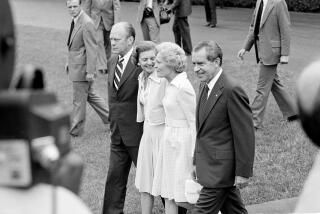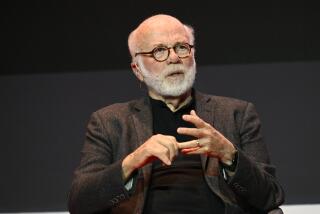He led by listening
- Share via
WASHINGTON — After Gerald R. Ford became president in 1974, he assembled a staff of strong, brilliant and highly opinionated personalities. Ford’s most enduring legacy, some have argued, is the people he brought into power, including Donald H. Rumsfeld, Dick Cheney, Brent Scowcroft and James A. Baker III.
Under three Republican presidents, it is a group that has shaped U.S. foreign policy through the end of the Cold War and its aftermath, nowhere more than during the presidency of George W. Bush, where Rumsfeld and Cheney helped set the course for a war on terrorism and the invasion of Iraq.
“I’ve talked to people over and over again, and if there is such a thing as a Republican national security apparatus in personnel, they’re all Gerald Ford’s people,” said Scowcroft, who replaced Henry Kissinger as national security advisor in the Ford years. “That’s pretty remarkable.”
Despite the continuity of the personnel, the way they made policy under Ford and the current president could not be more different, say officials familiar with both administrations. And that contrast has drawn attention as critics have probed the judgments that led to an Iraq war that is increasingly troubled.
In seeking answers to problems, Ford -- a veteran of more than two decades of debate in the House of Representatives -- relished the give-and-take of open and sometimes heated debate. He would force the strong egos that surrounded him to make their case in person during lengthy White House sessions, where he would constantly question the most minute details.
James T. Lynn, Ford’s budget director, recalled one particularly heated discussion among Cabinet members in front of Ford, which ended with the president thanking both sides and retreating to the Oval Office: “I had to go back into the president’s office with him, and he turned to me and said, ‘Wasn’t that fun?’ ”
Said L. William Seidman, a top Ford economic advisor, “I worked for three or four presidents, and I think more than any other president, [Ford] was determined that all views be presented to him before he made a decision. I think it’s very clear in the early days of the Bush administration, they did not have a process like that, and you had people like [Secretary of State Colin L.] Powell saying the State Department never had a chance to present to the president what would happen after the war started.”
Critics have cited the Bush team’s strong ideological position on Iraq from its earliest days, and questioned why faulty assumptions about that nation’s unconventional weapons program and its reaction to a U.S. military occupation were not more vigorously challenged before an invasion was launched.
Presidential historians and former Ford aides warn that too much can be made of the comparison in White House management styles. Bush, they contend, appears to be listening to more outside voices, particularly in his recent rethinking of Iraq policy. And Ford’s White House in his early months as president was a place of contention between holdovers from the Nixon administration and former House aides who moved down Pennsylvania Avenue.
In building his administration, Ford aides said, the former president brought in skilled advisors of varied ideological backgrounds. In addition to up-and-comers like Cheney and Rumsfeld -- who worked closely with Ford when they were fellow congressmen -- Ford tapped for his Cabinet leading intellects such as University of Chicago president Edward H. Levi, who became Ford’s attorney general, and William T. Coleman Jr., a distinguished civil rights lawyer who became Transportation secretary.
Ford, they said, was comfortable with being less knowledgeable than his advisors and was unthreatened by strongly voiced disagreements. Unlike almost any subsequent president, Ford was able to create a White House that was open to dissent. To this day, Ford alumni meet annually.
“I know that my friends in the Carter administration said they could never do anything like this, and the Reagan people didn’t because there were such rivalries and contests,” said James Cannon, a domestic policy advisor to Ford who went on to write one of the few biographies of the former president.
The comparisons with Bush’s style first broke into the public debate two years ago. Paul O’Neill, a senior official in the Ford White House’s budget office who three decades later became Bush’s Treasury secretary, cooperated with author Ron Suskind on a book that made critical contrasts between the two presidents.
In Suskind’s book “The Price of Loyalty,” O’Neill described Ford as a man comfortable around strong personalities, like Secretary of State Henry A. Kissinger and James R. Schlesinger, his first Defense secretary -- a trait O’Neill attributed to a quiet self-confidence mixed with a non-ideological approach to finding solutions.
In one passage, O’Neill recalled a meeting with Bush in the Oval Office in which he recounted to the president an economic conference he helped set up shortly after Ford took office, a forum featuring economists, business executives and labor leaders with widely differing views on fiscal policy.
“Ford was really good at the meeting,” O’Neill recalled telling Bush. “He showed that he was attentive and really knowledgeable about all competing positions.” Bush agreed to hold an economic conference of his own, but instead of opposing experts, attendees would almost universally be Bush supporters, and many were political donors. “It’ll just be a lot of people reading from a script that says, ‘I love the president,’ ” O’Neill told his staff when he saw the invitation list, according to Suskind’s account. “Where, exactly, does that fit in the grand American ideal of free and honest inquiry?”
Stephen Hess, a presidential scholar at the Brookings Institution, argued that O’Neill’s view of Ford’s presidency is somewhat idealized, and that Ford’s White House did not become well functioning until the last months of his presidency.
Bush administration officials have dismissed O’Neill’s criticism as the result of bitterness over his dismissal. “Paul has had his say,” said Cheney in 2004. “I disagree with his analysis, obviously.... I feel badly for him, to some extent, that he has ended his career on this note.”
Other Ford White House veterans, many of whom asked not to be named because they did not want to appear critical of Bush, say they share O’Neill’s view of the contrasts.
“The difference is, Ford was looking for answers to questions; he was looking for a way to formulate policy and what policies would work,” said one Ford alumnus who has discussed the issue with counterparts in the Bush administration. “These guys came in, and they knew what they wanted to do. They wanted people just to execute. They didn’t want to debate.”
To the Ford veterans, rigorous internal debates were a model that Bush was ignoring.
According to Suskind, what troubled O’Neill, along with then-Federal Reserve Chairman Alan Greenspan, who had been chairman of Ford’s Council of Economic Advisors, and some other Ford alumni, “was how the order was reversed, how discussions of desired messages seemed to come first and real policy debates came later as justification, or never. That made them fearful.”
*
*
(BEGIN TEXT OF INFOBOX)
In his words
‘I am a Ford, not a Lincoln.’
**
‘I have not sought this enormous responsibility, but I will not shirk it.... My fellow Americans, our long national nightmare is over. Our Constitution works; our great republic is a government of laws and not of men. Here, the people rule.’
**
‘A government big enough to give you everything you want is a government big enough to take from you everything you have.’
**
‘Theirs is an American tragedy in which we all have played a part. It could go on and on and on, or someone must write the end to it. I have concluded that only I can do that, and if I can, I must.’
**
‘The establishment of justice and peace abroad will in large measure depend upon the peace and justice we create here in our own country, for we still show the way.’
**
‘There is no Soviet domination of Eastern Europe, and there never will be under a Ford administration.’
**
From Reuters
More to Read
Get the L.A. Times Politics newsletter
Deeply reported insights into legislation, politics and policy from Sacramento, Washington and beyond. In your inbox twice per week.
You may occasionally receive promotional content from the Los Angeles Times.










